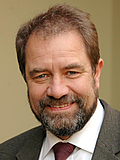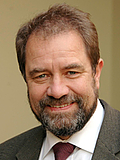Sonderforschungsbereich 854: Molekulare Organisation der Zellulären Kommunikation im Immunsystem Sprecher: Schraven, Burkhart; Prof. Dr. Projekthomepage:, http://www.sfb854.de, , , Finanzierung: Deutsche Forschungsgemeinschaft (DFG) ; 01.01.2018 bis 31.12.2021 Forschergruppen: Gesundheitscampus Immunologie, Infektiologie und Inflammation (GC-I³)
Projektleiter:
Projekthomepage:
Finanzierung:
The immune system is a highly mobile safeguard system constantly patrolling the whole body (including the CNS). Complex molecular signaling networks and communication processes control the generation of immune cells, their homeostasis as well as their tissue-specific functions in a spatiotemporal manner. Recent insights into the molecular mechanisms regulating the immune response have led to exciting new translational and therapeutic approaches such as immunotherapy of cancer and immunomodulation in inflammatory diseases. However, there is still a continuous need to further our understanding of the molecular organization and communication processes within the immune system.
CRC854 aims at elucidating the molecular basis of communication processes and networks that regulate immune responses in health and disease. To this end, the individual projects assess molecular mechanisms of immune cell communication at the intracellular, the intercellular and the organ level by using and developing state of the art biochemical, genetic and imaging technologies.
Immunology in Magdeburg is well known for its strength in signal transduction research, which was already the central theme of the CRC854-preceding FOR521 (DFG-funded from 2003 to 2009). CRC854 builds on and extends this well-established local expertise to analyze in-depth the molecular organization and dynamics of immunological communication processes.
During the 2nd funding period, a number of important new insights into the molecular mechanisms regulating immune-cell communication were made. For example, A20 and B12 identified inter- and intracellular signaling networks regulating the activation of integrins under physiological (e.g. during T-cell activation, B12) or pathophysiological conditions (e.g. in JAK2-V617F-positive myeloproliferative neoplasia, A20), while B26 obtained novel and exciting insights into the molecular mechanisms underlying Graft-versus-Host Disease (GvHD). It is planned to translate these results into clinical trials during the 3rd funding period.
A novel reporter mouse ("Catchup”-mouse, carrying red fluorescent neutrophils) was established during the 1st funding period (TP06E) and used to analyze intercellular communication processes in stroke (Z01) or malignant melanoma (A27). In addition, molecular tools (biosensors) generated during the 1st funding period were optimized during the 2nd funding period allowing analysis of dynamic changes of signaling molecules regulating proximal signaling steps of T-cell activation (B19) or the interaction between cells of the immune system and invading pathogens (Z01).
The knowledge as well as the molecular and genetic toolboxes generated during the 2nd funding period provide the basis for the research that CRC854 proposes for the 3rd funding period. Again, the planned research program of CRC854 is divided into:
Research Area A: "Molecular and cellular communication in inflammation and infection"
and
Research Area B: "Molecular and cellular regulation T lymphocytes”.
These two Areas are linked by the TWIN projects of CRC854, which address the question how communication between the immune system and the CNS is molecularly regulated.
The Area A projects follow the concept that - depending on the specific context - the immune system has to operate both in organ- and pathogen-specific modes of action. However, a comprehensive understanding of the molecular mechanisms regulating organ/tissue-specific immune responses and context/tissue-dependent functional adaptations of immune and non-immune cells is still missing.
Thus, all Area A projects aim at studying the molecular mechanisms of intra- and intercellular communication processes with a focus on organ-specific (brain, liver, kidney, hematopoietic system, skin), as well as pathogen- or malignancy-specific contexts.
The Magdeburg expertise in signal transduction research and in vivo investigation of signaling processes/immune cell dynamics is of central importance for the Area B projects, which focus on different signaling pathways and their impact on T cell development, T cell activation and T cell effector functions. Profound expertise in biochemistry will be combined with novel in vivo signaling reporter systems (biosensors) to study signaling processes regulating the dynamics of T cell differentiation or their local and systemic interactions with other cells.
The TWIN projects of CRC854 - embedded in both Area A and Area B and connecting them - result from the paradigm shift that the brain can no longer be viewed as an immune-privileged organ, separated from the immune system by the blood-brain barrier. Instead it is now well established that the CNS and the immune system constantly interact with each other and influence each other’s functions. The TWIN projects have their roots in RTG1167 (funded from 2005 until 2015).
Two former PhD students of RTG1167 head TWIN project A30N during the 3rd funding period. Notably, the Medical Faculty has declared "TWIN-related research” to be an integral part of its research profile and founded a new "Institute of Inflammation and Neurodegeneration” (IIN) in 2016. The director of the IIN, Prof. Ildiko Dunay, will co-head TWIN projects A25 and A28N during the 3rd funding period.
Taken together, CRC854 aims to understand the molecular mechanisms of signal processing during physiological and pathophysiological immune responses, and to connect intracellular signaling mechanisms with the dynamics of intercellular interactions. To achieve these goals, CRC854 will create added value by combining the local expertise in the fields of immunology and neuroscience. In addition, CRC854 did and further will establish new model systems and methodologies for the investigation of molecular mechanisms determining immune activation and dysregulation. It is expected that CRC854, integrated research training group MGK854, and the newly installed M.Sc. program "Immunology” will continue to impose a major impact on the field of molecular immunology.
CRC854 aims at elucidating the molecular basis of communication processes and networks that regulate immune responses in health and disease. To this end, the individual projects assess molecular mechanisms of immune cell communication at the intracellular, the intercellular and the organ level by using and developing state of the art biochemical, genetic and imaging technologies.
Immunology in Magdeburg is well known for its strength in signal transduction research, which was already the central theme of the CRC854-preceding FOR521 (DFG-funded from 2003 to 2009). CRC854 builds on and extends this well-established local expertise to analyze in-depth the molecular organization and dynamics of immunological communication processes.
During the 2nd funding period, a number of important new insights into the molecular mechanisms regulating immune-cell communication were made. For example, A20 and B12 identified inter- and intracellular signaling networks regulating the activation of integrins under physiological (e.g. during T-cell activation, B12) or pathophysiological conditions (e.g. in JAK2-V617F-positive myeloproliferative neoplasia, A20), while B26 obtained novel and exciting insights into the molecular mechanisms underlying Graft-versus-Host Disease (GvHD). It is planned to translate these results into clinical trials during the 3rd funding period.
A novel reporter mouse ("Catchup”-mouse, carrying red fluorescent neutrophils) was established during the 1st funding period (TP06E) and used to analyze intercellular communication processes in stroke (Z01) or malignant melanoma (A27). In addition, molecular tools (biosensors) generated during the 1st funding period were optimized during the 2nd funding period allowing analysis of dynamic changes of signaling molecules regulating proximal signaling steps of T-cell activation (B19) or the interaction between cells of the immune system and invading pathogens (Z01).
The knowledge as well as the molecular and genetic toolboxes generated during the 2nd funding period provide the basis for the research that CRC854 proposes for the 3rd funding period. Again, the planned research program of CRC854 is divided into:
Research Area A: "Molecular and cellular communication in inflammation and infection"
and
Research Area B: "Molecular and cellular regulation T lymphocytes”.
These two Areas are linked by the TWIN projects of CRC854, which address the question how communication between the immune system and the CNS is molecularly regulated.
The Area A projects follow the concept that - depending on the specific context - the immune system has to operate both in organ- and pathogen-specific modes of action. However, a comprehensive understanding of the molecular mechanisms regulating organ/tissue-specific immune responses and context/tissue-dependent functional adaptations of immune and non-immune cells is still missing.
Thus, all Area A projects aim at studying the molecular mechanisms of intra- and intercellular communication processes with a focus on organ-specific (brain, liver, kidney, hematopoietic system, skin), as well as pathogen- or malignancy-specific contexts.
The Magdeburg expertise in signal transduction research and in vivo investigation of signaling processes/immune cell dynamics is of central importance for the Area B projects, which focus on different signaling pathways and their impact on T cell development, T cell activation and T cell effector functions. Profound expertise in biochemistry will be combined with novel in vivo signaling reporter systems (biosensors) to study signaling processes regulating the dynamics of T cell differentiation or their local and systemic interactions with other cells.
The TWIN projects of CRC854 - embedded in both Area A and Area B and connecting them - result from the paradigm shift that the brain can no longer be viewed as an immune-privileged organ, separated from the immune system by the blood-brain barrier. Instead it is now well established that the CNS and the immune system constantly interact with each other and influence each other’s functions. The TWIN projects have their roots in RTG1167 (funded from 2005 until 2015).
Two former PhD students of RTG1167 head TWIN project A30N during the 3rd funding period. Notably, the Medical Faculty has declared "TWIN-related research” to be an integral part of its research profile and founded a new "Institute of Inflammation and Neurodegeneration” (IIN) in 2016. The director of the IIN, Prof. Ildiko Dunay, will co-head TWIN projects A25 and A28N during the 3rd funding period.
Taken together, CRC854 aims to understand the molecular mechanisms of signal processing during physiological and pathophysiological immune responses, and to connect intracellular signaling mechanisms with the dynamics of intercellular interactions. To achieve these goals, CRC854 will create added value by combining the local expertise in the fields of immunology and neuroscience. In addition, CRC854 did and further will establish new model systems and methodologies for the investigation of molecular mechanisms determining immune activation and dysregulation. It is expected that CRC854, integrated research training group MGK854, and the newly installed M.Sc. program "Immunology” will continue to impose a major impact on the field of molecular immunology.
Kontakt

Prof. Dr. Burkhart Schraven
Otto-von-Guericke-Universität Magdeburg
Institut für Molekulare und Klinische Immunologie
Leipziger Str. 44
39120
Magdeburg
Tel.:+49 391 6715800
weitere Projekte
Die Daten werden geladen ...


